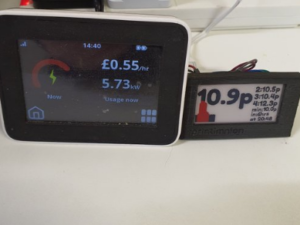I’ve been playing with Raspberry Pi’s, Arduinos, electronics and mechanics for years, building fun projects, daft projects or just learning new things. Time to bring it all together and actually do something useful for myself, and maybe save some money at the same time.
So, I’ve started to look at home automation and our energy usage and costs.
My overall aim is to reduce our energy costs at home, and to make things more comfortable. However I don’t want a situation where I have an app for the lights, an app for the heating, an app for this and an app for that. I like the approach taken by the founder of Home Assistant (Open Source Home Automation app) Paulus Schoutsen – Good home automation never annoys, but is missed when it’s not working. It’s covered in more detail in his blog post here: https://www.home-assistant.io/blog/2016/01/19/perfect-home-automation/
There are a lot of different technologies available today, and also companies that implement them. I could just get someone in to design a solution and pay them to implement it, but where’s the fun in that? Also I could just throw money at the problem, but what’s the point spending thousands if the run costs are only then reduced by a few pounds? Then there’s the timescale, if the costs are to be balanced with the rewards then I need a period over which to measure this. If I assume I’ll retire at 65 then I have around 10 years before I get there. For a number of solar and other solutions I’ve read the payback seems to be around that time, so that seems like a good yard stick. Also if I can minimise our energy costs by that point then I have more money to spend on toys when I retire – great!
I decided to set myself some guidelines before I start:
- Aim – Reduce home energy costs as far as possible
- Any costs incurred must pay back within 10 years
- The solution should be hidden and not a chore to use
- Any tech implemented should be easily replaceable in the future
- I should publish everything to help others with similar aims
So, where to start? I’ve found with other projects that rather than spend a long time trying to work out a complete plan, especially when I don’t know what I’m doing, my best option is to do some initial investigation and then start. Ideally each step from there should be small and if possible useful, but even if a step fails I can learn from it and still continue with the overall goal.
We currently have:
- Mains electricity – powering everything but the heating and hot water
- Oil fired boiler – heating and hot water
The oil tank for the boiler is not ideally located and the boiler itself is getting older. Of the bigger jobs within the project this will need to take early priority but will also need significant research, planning and funds. Mains electricity is a given, but I expect to be able to reduce costs and also use renewable as far as possible.
The eventual aim is to generate as much as possible of our needs ourselves, use the minimum that we can from the grid, and heat the house from renewables too. I expect this to be some combination of:
- Low cost grid electricity from a renewables only supplier
- Solar (PV) panels
- Ground source heating
Wind could also be an option, but as we are located in an Area of Outstanding Natural Beauty(AONB) planning permission could be an issue, and honestly I don’t really want to see or hear a large wind turbine.
All of this should be easily monitored and controlled via some form of dashboard but should ideally manage and control itself.
After some initial investigation there are lots of tech options out there but I’ve compiled a shortlist to start:
- Sonoff switches appear to be low cost and easy to use
- Raspberry Pi will be my starting platform
- Node Red and MQTT seem ideal for coordination
- Home Assistant looks interesting for overall automation
- InfluxDB seems to be widely used for storing data
- Grafana for displaying the data
Lots to look at, I’d better get started …

